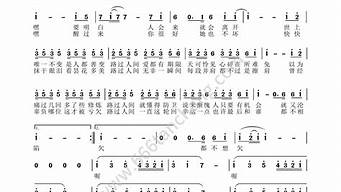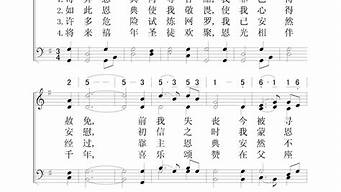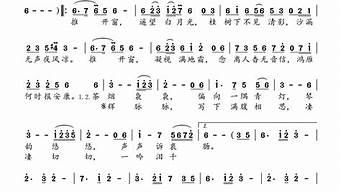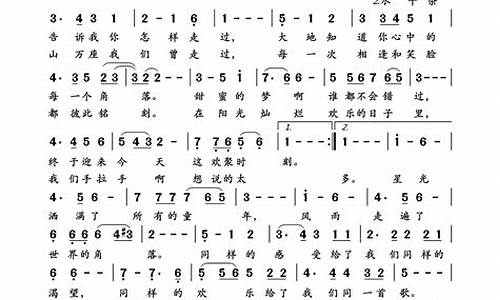歌词一花一世界一叶一菩提是什么歌_歌词一花一世界,一叶一菩提是什么歌
1.一花一世界,一叶一追寻.一曲一场叹,一生为一人. 的意思是什么?和"一花一世界,一叶一菩提有什么不同吗?
2.一花一世界,一叶一追寻。一曲一场叹,一生为一人。下联是什么
3.一花一世界,一叶一菩提全诗是什么?
4.一花一叶一菩提是什么意思?
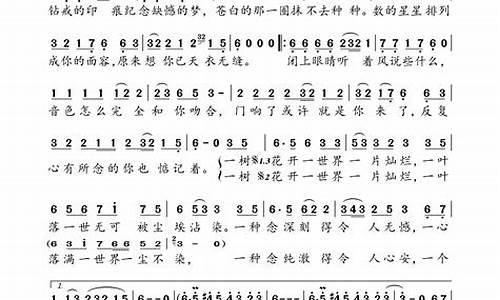
原唱蔡依林,翻唱刘瑞琦
《万花瞳》
词:严云农
曲:阿沁
编曲:韩立康
后青涩的愿景 蜕变前的追寻
一花一世界 缩放在瞳孔里
不规则的足迹
带我来到这里
而你是光 让爱被照亮现形
携手 前进 真实所有幻影
旋转 搜集 视线里的光明
微笑 编辑 与梦对称的图形
我在 最近的未来
见证 万花盛开
我们该期待
进化中的 新世界存在
你是 最远的灿烂
无惧 所有黑暗
逆着光斑斓
宛如碎钻 闪耀着时代
再定义 下个世代
若生命是倒影 宇宙是面镜
我更要眼神 反映各种华丽
一时的小确幸
永恒的不确定
每朵花摇曳着 绝版的美丽
携手 前进 爱若是易碎品
碰撞 变形 也要构成风景
堆砌 结晶 奢华你我的身影
我在 最近的未来
见证 万花盛开
我们该期待
进化中的 新世界存在
你是 最远的灿烂
无惧 所有黑暗
逆着光斑斓
宛如碎钻 闪耀着时代
再定义 下个世代
I see the future
I see the future
I see the future
我在 最近的未来
见证 万花盛开
我们该期待
进化中的 新世界存在
你是 最远的灿烂
无惧 所有黑暗
逆着光斑斓
宛如碎钻 闪耀着时代
再定义 下个世代
一花一世界,一叶一追寻.一曲一场叹,一生为一人. 的意思是什么?和"一花一世界,一叶一菩提有什么不同吗?
《华严经》:佛土生五色茎,一花一世界,一叶一如来 。佛曰:一花一世界,一木一浮生,一草一天堂,一叶一如来,一砂一极乐,一方一净土,一笑一尘缘,一念一清静。
《佛典》:一砂一世界,一花一天堂 。
《梵网经》卷上谓:卢舍那佛坐千叶大莲花中,化出千尊释迦佛,各居千叶世界中,其中每一叶世界的释迦佛,又化出百亿释迦佛,坐菩提树。
《地藏菩萨本愿经》:佛告文殊师利、譬如三千大千世界、所有草木丛林、稻麻竹苇、山石微尘。一物一数、作一恒河。一恒河沙、一沙一界。一界之内、一尘一劫。一劫之内、所积尘数、尽充为劫。
《金刚经正解卷下》:恒河沙等之恒河沙。一沙一世界国土中。所有众生。各具一心。则其心有若干种。如来以清净五眼。皆尽见而知之” 。
《大方广圆觉修多罗了义经要解上》:诸佛世界者。百千万亿僧只等数之河。一一河中一沙一世界者。显世界之多矣。
《黄龙死心新禅师语录》送禅人持钵:融融春景绝纤埃。五叶腾芳七叶开。子内子生枝上菓。一花一叶一如来。
《佛海瞎堂禅师广录》:一花一叶一如来。一佛一刹一报土。
《憨山老人梦游集卷第三十七》怀大都千佛寺 忆昔千花七宝台:一花一叶一如来。不知近日花闲佛。可似当年震法雷。
《全唐诗》第151卷 刘长卿《戏赠干越尼子歌》:……北客相逢疑姓秦,铅花抛却仍青春。一花一竹如有意,不语不笑能留人。……
唐蜗寄题庐山东林寺三笑庭联:桥跨虎溪,三教三源流,三人三笑语;莲开僧舍,一花一世界,一叶一如来。
一花一世界,一叶一追寻。一曲一场叹,一生为一人。下联是什么
1、“一花一世界,一叶一追寻.一曲一场叹,一生为一人”改编自布莱克 《天真的预言》,意思大致为:一个花也可以拥有它自己的世界,一片叶子也有它自己的追求;一首曲子有它凄凉的时候,一生只为一个人活着。
原诗为:
To see a world in a grain of sand
And a heen in a wild flower,
Hold infinity in the palm of your hand
And eternity in an hour.
一粒沙子看出世界,
一朵野花里见天国。
在你掌里盛住无限,
一时间里便是永远。
2、“一花一世界,一叶一菩提”见于传统的佛学经典语论中,从字面上的意思理解,就是一朵花就是一个世界,一片菩提叶就代表着一棵菩提树。
佛曰:一花一世界,一草一天堂,一叶一如来,一砂一极乐,一方一净土,一笑一尘缘,一念一清静。这一切都是一种心境。心若无物就可以一花一世界,一草一天堂。参透这些,一花一草便是整个世界,而整个世界也便空如花草。
3、不论是佛学的“一花一世界,一叶一菩提”,还是文学的“一沙一世界,一花一天堂”,其表达的意思大致相同。
对于我们整个人类来说,生命应该是没有止境的,物质也是永恒发展的。但是,在天体的转动和岁月的轮回中,我们却分明地看到每一个个人所拥有的单个生命在时空轮回中的单薄无力,我们这些单个的个体在宇宙中渺小得恐怕不及沧海一粟。
然而,活着的人们是不甘落没的,即便是痛苦,他们也希冀着。于是,一个人的希冀传给另一个人就是两个人的希冀,两个人的希冀延续下去,就是一个民族的希冀,一个民族的希冀传给另一个民族就是两个民族的希冀,两个民族的希冀再延续下去,那就是整个人类、整个宇宙的希冀。做为个体的、自我的个人来说,希冀是卑微的,但是若干个、千万个卑微的希翼凝结在一起,就是一个物种巨大的生命力。
人类的个体在一代代的更新着,人类的历史在一天天的漫延着。多少朝代在我们的身边升起又降落?多少文明早我们的眼前生长又衰退?然而,生命这一物种却穿越过时间和空间的阻隔,顽强的延续着。
扩展资料:
1、威廉·布莱克(William Blake),英国第一位重要的浪漫主义诗人、版画家,英国文学史上最重要的伟大诗人之一,虔诚的基督教徒。主要诗作有诗集《纯真之歌》、《经验之歌》等。早期作品简洁明快,中后期作品趋向玄妙深沉,充满神秘色彩。
2、《天真的预言》全文
To see a world in a grain of sand
And a heen in a wild flower,
Hold infinity in the palm of your hand,
And eternity in an hour.
A robin redbreast in a cage
Puts all heen in a rage.
A dove-house fill'd with doves and pigeons
Shudders hell thro' all its regions.
A dog starv'd at his master's gate
Predicts the ruin of the state.
A horse misused upon the road
Calls to heen for human blood.
Each outcry of the hunted hare
A fibre from the brain does tear.
A skylark wounded in the wing,
A cherubim does cease to sing.
The game-cock clipt and arm'd for fight
Does the rising sun affright.
Every wolf's and lion's howl
Raises from hell a human soul.
The wild deer, wand'ring here and there,
Keeps the human soul from care.
The lamb misus'd breeds public strife,
And yet forgives the butcher's knife.
The bat that flits at close of eve
Has left the brain that won't believe.
The owl that calls upon the night
Speaks the unbeliever's fright.
He who shall hurt the little wren
Shall never be belov'd by men.
He who the ox to wrath has mov'd
Shall never be by woman lov'd.
The wanton boy that kills the fly
Shall feel the spider's enmity.
He who torments the chafer's sprite
Wees a bower in endless night.
The caterpillar on the leaf
Repeats to thee thy mother's grief.
Kill not the moth nor butterfly,
For the last judgement draweth nigh.
He who shall train the horse to war
Shall never pass the polar bar.
The beggar's dog and widow's cat,
Feed them and thou wilt grow fat.
The gnat that sings his summer's song
Poison gets from slander's tongue.
The poison of the snake and newt
Is the sweat of envy's foot.
The poison of the honey bee
Is the artist's jealousy.
The prince's robes and beggar's rags
Are toadstools on the miser's bags.
A truth that's told with bad intent
Beats all the lies you can invent.
It is right it should be so;
Man was made for joy and woe;
And when this we rightly know,
Thro' the world we safely go.
Joy and woe are woven fine,
A clothing for the soul divine.
Under every grief and pine
Runs a joy with silken twine.
The babe is more than swaddling bands;
Throughout all these human lands;
Tools were made and born were hands,
Every farmer understands.
Every tear from every eye
Becomes a babe in eternity;
This is caught by females bright,
And return'd to its own delight.
The bleat, the bark, bellow, and roar,
Are wes that beat on heen's shore.
The babe that weeps the rod beneath
Writes revenge in realms of death.
The beggar's rags, fluttering in air,
Does to rags the heens tear.
The soldier, arm'd with sword and gun,
Palsied strikes the summer's sun.
The poor man's farthing is worth more
Than all the gold on Afric's shore.
One mite wrung from the lab'rer's hands
Shall buy and sell the miser's lands;
Or, if protected from on high,
Does that whole nation sell and buy.
He who mocks the infant's faith
Shall be mock'd in age and death.
He who shall teach the child to dou
The rotting gre shall ne'er get out.
He who respects the infant's faith
Triumphs over hell and death.
The child's toys and the old man's reasons
Are the fruits of the two seasons.
The questioner, who sits so sly,
Shall never know how to reply.
He who replies to words of dou
Doth put the light of knowledge out.
The strongest poison ever known
Came from Caesar's laurel crown.
Nought can deform the human race
Like to the armour's iron brace.
When gold and gems adorn the plow,
To peaceful arts shall envy bow.
A riddle, or the cricket's cry,
Is to dou a fit reply.
The emmet's inch and eagle's mile
Make lame philosophy to smile.
He who dous from what he sees
Will ne'er believe, do what you please.
If the sun and moon should dou,
They'd immediately go out.
To be in a passion you good may do,
But no good if a passion is in you.
The whore and gambler, by the state
Licensed, build that nation's fate.
The harlot's cry from street to street
Shall wee old England's winding-sheet.
The winner's shout, the loser's curse,
Dance before dead England's hearse.
Every night and every morn
Some to misery are born,
Every morn and every night
Some are born to sweet delight.
Some are born to sweet delight,
Some are born to endless night.
We are led to believe a lie
When we see not thro' the eye,
Which was born in a night to perish in a night,
When the soul slept in beams of light.
God ears, and God is light,
To those poor souls who dwell in night;
But does a human form display
To those who dwell in realms of day.
参考资料:
一花一世界,一叶一菩提全诗是什么?
一沙一尘埃,一粒一倾诉,一殇一次怨,一世只一回。
一花一世界,一叶一追寻,一曲一场叹,一生为一人出自布莱克 《天真的预言》。
意思大致为:一个花也可以拥有它自己的世界,一片叶子也有它自己的追求;一首曲子有它凄凉的时候,一生只为一个人活着。
表达了作者非常的想念另外一半,而又很难实现的一种伤感,凄美的感情。
一朵鲜花的盛开与凋零就像一个世界的循环。一片叶子的萌芽,就像一个人对目标的追寻。一段曲乐,包含着一段离愁的哀叹,一个人的一生,也就是当了一回人。
意境与佛偈《心是莲花开》中的“一花一天堂,一草一世界,一树一菩提,一土一如来,一方一净土,一笑一尘缘,一念一清净,心是莲花开。”有异曲同工之妙。
很多国人也热衷翻译那四句,其中不乏一些才子名流,比如徐志摩的“一沙一世界,一花一天堂。
总之,这四句诗在与禅同根、大众推波、名家助澜的合力造就下,成就了不朽的知名度。
一花一叶一菩提是什么意思?
一花一世界,一叶一菩提全诗如下:
一花一世界,一木一浮生。
一草一天堂,一叶一如来。
一砂一极乐,一方一净土。
一笑一尘缘,一念一清静。
语出《佛典》,意思是说:哪怕是朵小小的花也有他自己的世界,一棵小小的草也是有菩提般的心,每个人都是有自己想法的,主观的,有权利的,有理想的,存在即是合理的。每个人都有他存在的道理,都值得被尊重。
生活的一切原本都是由细节构成的,如果一切归于有序,决定成败的必将是微若沙砾的细节“菩提”一词为古印度语Bodhi的音译,意思是觉悟、智慧,用以指人忽如睡醒,豁然开悟,突入彻悟途径,顿悟真理,达到超凡脱俗的境界等。
《梵网经》卷上谓:
卢舍那佛坐千叶大莲花中,化出千尊释迦佛,各居千叶世界中,其中每一叶世界的释迦佛,又化出百亿释迦佛,坐菩提树。一花一世界一叶一菩提,理解:
一朵花就是一个宇宙。一个人身也是一个宇宙。万物渺小或者宏大,微观世界或者宏观世界,都是一个世界。对于生长在花里的细菌来说,哪就是他们的地球。对于生长的地球之外的比我们更宏大的生物来说,我们的地球只是一个皮球。
当自己心中有了佛性,就不必纠缠于佛的外表,不会以声色行为等见佛。万物都有自身天生的佛性,只是自己没有发现,平凡人不具备个能力看见罢了。所以说一树也是一个菩提。
一花一世界一叶一菩提全文是:一花一世界,一木一浮生,一草一天堂,一叶一如来,一砂一极乐,一方一净土,一笑一尘缘,一念一清静。
《梵网经》卷上谓:卢舍那佛坐千叶大莲花中,化出千尊释迦佛,各居千叶世界中,其中每一叶世界的释迦佛,又化出百亿释迦佛,坐菩提树。一花一世界一叶一菩提,理解:
一朵花就是一个宇宙。一个人身也是一个宇宙。万物渺小或者宏大,微观世界或者宏观世界,都是一个世界。对于生长在花里的细菌来说,哪就是他们的地球。对于生长的地球之外的比我们更宏大的生物来说,我们的地球只是一个皮球。
当自己心中有了佛性,就不必纠缠于佛的外表,不会以声色行为等见佛。万物都有自身天生的佛性,只是自己没有发现,平凡人不具备个能力看见罢了。所以说一树也是一个菩提。
佛主拈花一笑是一种至为详和宁静的心境,不着形迹、超脱一切,是一种“无相”、“涅盘”的极高的境界。
佛祖拈花一笑,笑的时候不是一个过程,而是一个静态,这个静态,一个人手拈一朵花,微笑着静静的看着,看不到他在乱想什么,只看到他静静的享受着什么。看的是这个简静的场面,而不是乱猜佛祖拈花在笑什么,不是猜佛祖笑,不是猜花中有什么秘密。
摩诃迦叶是心不动,静静的观看,不走心的,而佛祖拈花一笑,摩诃迦叶看佛祖拈花一笑而笑,所以佛祖说摩诃迦叶已经领悟,其实就是指这种至为详和宁静的心境,不着形迹、超脱一切的境界。
声明:本站所有文章资源内容,如无特殊说明或标注,均为采集网络资源。如若本站内容侵犯了原著者的合法权益,可联系本站删除。


